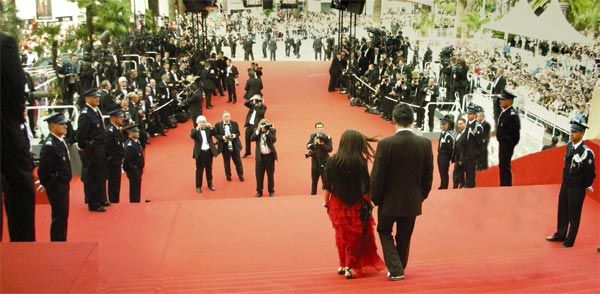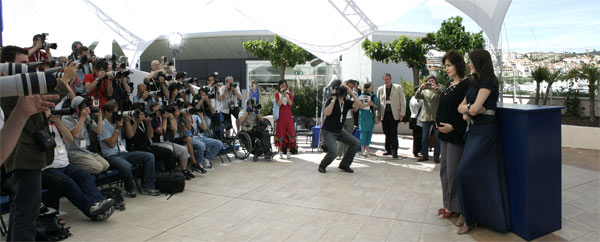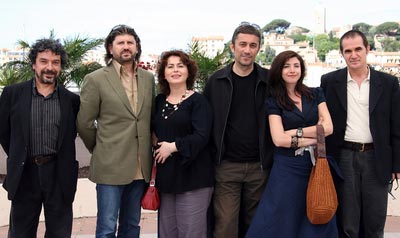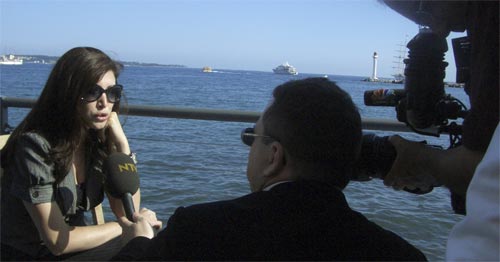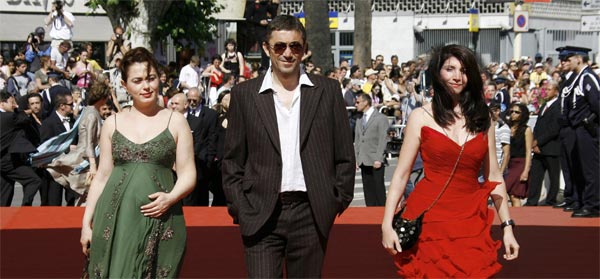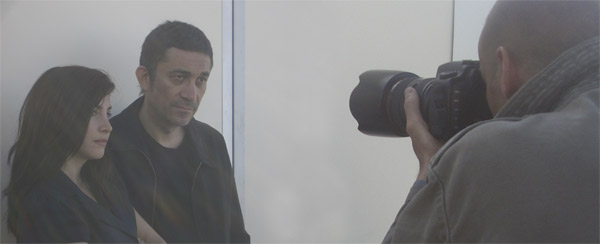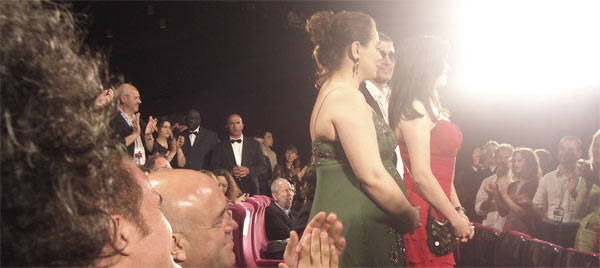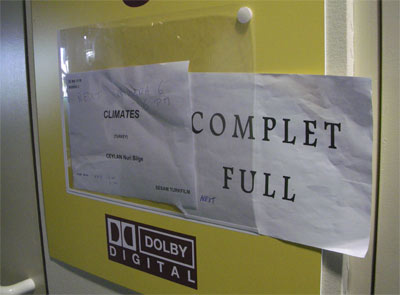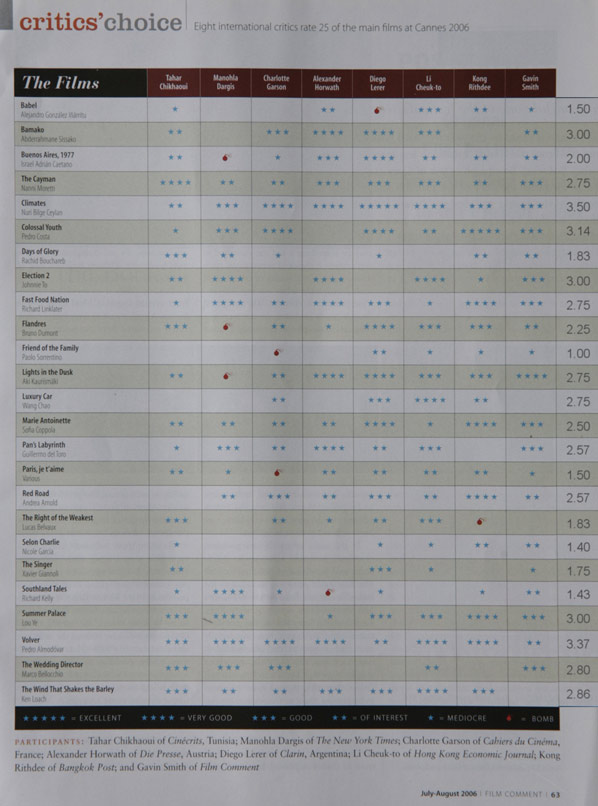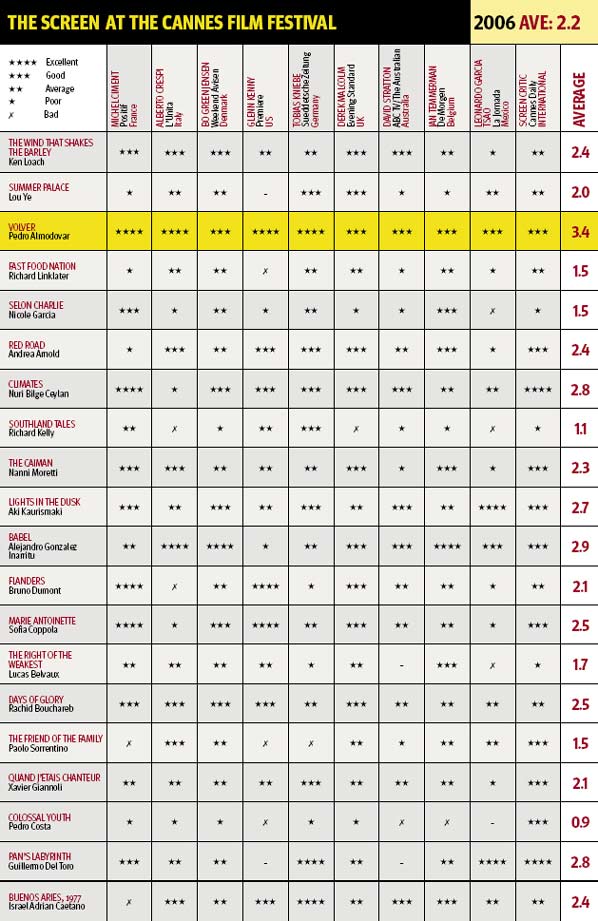
|
Cannes is the international capital of motion-picture arts. Cannes Film Festival , privileged venue of meetings and discoveries, is the most important film event in the world. Each and every year, Cannes Film Festival becomes the key crossroads for the entire film industry. A total of over 30,000 cinema professionals, including distributors, producers, directors, actors, technicians and the media, and over 200,000 other people, meet in Cannes for 900 screenings at the Palais and numerous other cinema events. Its success and development have turned it into a vast city in which one may sometimes get lost: 30,000 professionals are accredited each and every year at the Festival or Marché du Film, including 1,000 directors, 4,000 distributors, 5,000 producers and 4,000 journalists. The competition is the Festival's main event, and where you will find all the glamour and glory. Films in this section are referred to as being 'in competition' and compete for a variety of awards.
The list of the competition films : - Pedro
Almodovar, Volver
-
Press during the festival - ...If
'Southland Tales' is a hugely disappointing follow-up to 'Donnie Darko',
the same cannot be said for Nuri Bilge Ceylan's 'Climates', which is as
subtle, substantial and sublimely beautiful as was his previous 'Uzak'
('Distant'). ...Ceylan's
growing reputation as a contemporary master is confirmed by the immensely
satisfying Climates, which is certainly as personal as anything we’re
likely to see in Cannes, or anywhere else, this year... Climates tells
a complex, understated story about the emotional distance between people,
and about the psychic repressions and unshakable habits that hamper men...
The maturity of Ceylan's storytelling is evident from his refusal to tell
us too much: he prefers silences and finely-tuned facial expressions provide
the nuances we need to fill in the blanks for ourselves. In terms of what
faces can express, without ever doing too much, Climates puts Ceylan on
a par with Ingmar Bergman... If Isa really does resemble Ceylan, then
Climates surely offers one of the most merciless self-portraits ever seen
in cinema: Isa is insecure, faithless and selfish, excessively needy and
with a violent streak which emerges in his assault on Serap... but either
way, Ceylan's latest hints at a richness, complexity and subtlety of feeling
that are rare even among today's most revered blue-chip directors. ...'Distant'
was enthralling or infuriating, depend on your threshold of love or pain
for emotional minimalism. Climates was much more involving, perhaps because
it's simply a better, more human film... The
film covers three seasons, three locations, three climates: summer heat,
autumn rain, winter snow. All photographed gloriously. In the final section,
Isa now goes searching for Bahar — perhaps because he loves her, perhaps
to convince himself that he could still have her if he wanted her... Even
those filmgoers who are averse to the minimalist aesthetic can find reasons
to praise Climates. Here are four. One is that under its cloak of aesthetic
severity, Climates has a beating heart, aware of the charm, selfishness
and contradictions in any person. Another is that, though Ceylan the director
loves taking long closeups of Ceylan the actor, he's worth it; this is
a face, craggily attractive, that rewards extended attention. A third
is that the movie occasionally reveals a wry, wise sense of humor. On
his second encounter with Serap, she is the one eager to have sex, he
the reluctant one. As she cuddles up, he suddenly takes notice of a TV
news report on a natural disaster. Won't you make love? she asks. He shakes
his head. "Earthquake," he says — the Turkish equivalent of
"Not tonight, dear, I have a headache." The fourth is that Climates
has a real climax: at the end, as at the beginning, a tear down Bahar's
cheek. This time, though, it's a lovely epiphany that fulfills and finalizes
her relationship with Isa...
...Nuri
Bilge Ceylan's "Climates" is the understated tale of a couple,
played by Ceylan and his wife, whose emotions are mirrored by the changing
seasons in Turkey. Ceylan's film, which is an early favorite among critics,
takes the audience from a couple's break-up on a hot summer's day to the
cool assessment of their relationship in snow-covered fields months later... ...the
most accomplished competing film, Nuri Bilge Ceylan's Climates, is, like
the Turkish director's previous Distant, a study in alienation... ...Following his solemn
tour de force "Distant," Turkey's Nuri Bilge Ceylan sharpens
his vision like a knife with "Climates," a sparse exacting drama
- stunningly photographed in crisp Hi-Def digital video... I’m fighting back tears
as I encounter the first, probably only, masterpiece of the festival.
I’m in the balcony at the Debussy and am wiped out, trembling, trying
to recover, having just been witness to the mesmerizing, devastating Climates
by Turkish filmmaker Nuri Bilge Ceylan. I say without equivocation he
is one of the five best narrative filmmakers alive. Climates tracks the
emotional and personal contours of a couple’s relationship (played by
the director and his own wife, intensifying the sting of pain and regret).
It’s shot on digital and is the most extraordinary, immediate use of that
format I’ve ever seen. Late in the film, the man caresses his wife as
she lies on a hotel bed, and the photorealistic imagery is so vital, direct,
and pure, I think it’s my own hand reaching across to her. ...Climates,
from Turkey's Nuri Bilge Ceylan, the director of Distant, has the cool
temperature of a 1960s art film - Antonioni, perhaps. It's a minutely
observed study of a crumbling marriage over three seasons with a taciturn,
stonily remote protagonist... ...Turkish
director Nuri Bilge Ceylan won fulsome critical praise for his understated
tale of a couple, played by Ceylan and his wife, whose emotions are mirrored
by changing seasons... ...Nuri Bilge
Ceylan returned this year with Climates. It's another measured, slyly
comic exploration of middle-aged men's lassitude... The film, shot on
high-definition video, is startlingly attractive to behold; the sweat
on Ebru's brow as she lies on a beach almost invites us to reach forward
and lick it.
...Some films
such as Turkish filmmaker Nuri Bilge Ceylan's "The Climates"
have fiercely divided camps between those who saw it as a fine art house
movie and those who panned it for being plodding and self-indulgent. ...It's
unquestionably a powerful and absorbing work for those with patience,
and it's tunningly photographed... ...Turkey's
elegist of existential ennui, Nuri Bilge Ceylan, comes up with his most
approachable pic in "Climates," a study of a failed relationship
shown largely through the eyes and mind of the middle-aged male partner.
Immaculately shot and composed as always, and moving at Ceylan's usual
measured pace, this one is slightly enlivened by more likable perfs and
a trim 98-minute running time... ...And here's an interesting
grace note from Cannes: One of the films generating the biggest buzz at
the festival is Climates, by Turkish director Nuri Bilge Ceylan. Despite
its title, the film has absolutely nothing to do with global warming or
climate change. Rather it's the story of a man's inner change. Festival
audiences have been mesmerized by the powerful rendering of his transformation.
If you
were after something more economical, measured and adult, there was nothing
to equal Climates. Turkish director Nuri Bilge Ceylan daringly casts himself
and his wife Ebru Ceylan as an Istanbul couple who split up while on holiday,
then meet up again in snowbound Anatolia. Ceylan uses High Definition
video, with all its precision and clarity, to get under his characters'
skin with an acuity comparable to Ingmar Bergman, but he also creates
some of the breathtakingly stark landscape shots that made his Uzak so
special. It's a small film, which often counts as a criticism in Cannes,
but it's intensely personal, and confirms Ceylan as one of today's real
auteurs - one of those film-makers who, as they say here, has a signature. ...In Climates, Ceylan depicts
the solitude of a man after breaking up with a younger woman whom he now
wants to find and convince to take him back... The characteristic sparse
dialogue is here, as are the superb long shots, close-ups and the rare
figurative sophistication... ...That's why Cannes welcomes
the bonhomie of Almodovar, the quiet modesty of the twice-winning Dardennes
brothers, the lucidity of David Cronenberg, or the hopeful earnestness
of the youngish filmmakers who might find themselves deservedly rocketed
into the pantheon. Among the latter, in this year's competition, I'd tip
the extraordinary Turkish filmmaker Nuri Bilge Ceylan, who made the wonderful,
contemplative Uzak in 2002. Ceylan is so unassumingly go-it-alone that
the reason he was so hard to track down for interviews on Uzak was not
standoffishness, but a full schedule: he was working single-handedly as
his own sales agent and producer. This year he co-stars with his wife
Ebru Ceylan in Climates, a relationship drama that could be the most moving,
and most personal film in competition...
Tomorrow night the Palme
d'Or and Cannes' other prizes will be handed out. The morning line of
speculation from the critics had Pedro Almodóvar's Volver and Alejandro
González Iñárritu's Babel holding as the frontrunners, with Nuri Bilge
Ceylan's Climates as an honorable compromise candidate. But we know nothing... ...Irruption, aussi, parce
que côtoyant en sélection officielle des films américains rivalisant de
mauvais goût et d'esbroufe inesthétique, Les Climats apparaît comme un
rappel de ce que peut être le vrai cinéma d'auteur, de ce que signifient
un regard, un cadrage, une mise en scène et une respiration... Deux autres films ont occupé
un week end bien chargé, qui tous deux démontrent qu'à Cannes, au festival,
bien davantage que les vedettes sur tapis rouge, c'est la singularité
d'un regard et d'un univers qui compte et marque. "Les Climats"
du cinéaste turc Nuri Bilge Ceylan, et "Les Lumières du faubourg"
du finlandais Aki Kaurismäki. La splendeur froide et pourtant toute de
braise du premier, l'éclat frontal, métallique, hiératique, du second,
forment des mondes que l'on reconnaît au premier coup d'œil, où évoluent
des personnages simples et monolithiques au premier abord, mais en définitive
totalement nuancés et complexes, car d'une opacité qui relance sans cesse
les interprétations. Je crois qu'il s'agit là de la qualité principale
de ces deux films: leur forme même, qui laisse a priori le spectateur
à l'extérieur, contemplant deux objets paraissant clos et autosuffisants,
a de fait un besoin vital de la participation du "contemplant".
Qui entre dans le film, comme sous hypnose, pour dialoguer avec les personnages
plus intimement, et comme "finir" le film. C'est pour cela que
Ceylan et Kaurismäki sont de grands artistes: ils pourraient faire et
vivre leurs films dans leur coin, mais ils n'existent en réalité qu'à
travers la rencontre avec un public, certes modeste, mais dont chaque
fragment se transforme, sous l'effet de la vision et de l'interprétatio
du film, en un individu. Ces deux films, qu'on pourrait croire froids
et fermés, clos dans leur parabole, sont au contraire de parfaits révélateurs
d'humanité... Un film qui cumule les atmosphères...
Les jeux de l’amour et du hasard sont ici maîtrisés avec séduction... Difficile de parler du nouveau
film de Nuri Bilge Ceylan ‘Ilklimer’ - ‘Les Climats’ en français - tant
le thème abordé est intensément universel mais abordé ici d’un point de
vue totalement intimiste. Pour évoquer l’étiolement d’un couple, Ceylan
s’est mis en scène avec sa propre femme Ebru Ceylan. Du bel ouvrage que
ces ‘Climats’ qui sont autant d’émotions et de sentiments différents qui
traversent nos existences sans que l’on en soit totalement maître. Dans
la chaleur de l’été, il y a ce couple qui se dénoue faute de ne pouvoir
encore partager, communiquer. Dans la rigueur de l’hiver, il y a ce couple
qui se retrouve sans pouvoir renaître de ses cendres. Isa et Bahar se
séparent et laissent passer le temps ou peut-être le subissent-ils. Le
scénario minimaliste est transcendé par une caméra quasi fixe qui donne
au film des allures de photographie. Nuri Bilge Ceylan filme en plans
serrés et en silence deux visages égarés, impuissants. Car les mots sont
rares et se posent par touche dans ce film. Juste ce qu’il faut pour pénétrer
dans l’univers de ces personnages perdus dans une impasse existentielle
et émotionnelle. Juste ce qu’il faut pour partager un profond malaise.
Oppressant et lancinant, ce long métrage, gorgé d’humanité, de sincérité
et de réalisme, pèse sur le spectateur, témoin d’une fracture et de la
mort de l’amour. Epuré, contemplatif et aphone, il laisse une empreinte
inaltérable, celle d’une image minérale et brillante qui donne tout son
sens à cette deuxième sélection du réalisateur turc au Festival de Cannes.
... On est fasciné à nouveau
par le talent de Ceylan: la pertinence avec laquelle il compose ses images,
la précision millimétrique avec laquelle il poste sa caméra, la subtilité
avec laquelle il évoque les états d'âmes de ses personnages, et sa faculté
d'intégrer les saisons, la nature, et ses jeux de lumières comme de véritables
protagonistes. Par exemple, au moment de la rupture, lorsque les rayons
du soleil déjà couché irradient la couronne de feuilles d'un arbre lointain.
Plus tard encore, lorsque Isa traverse l' Anatolie orientale à la recherche
de son amour perdu et que la neige tombe en si grande quantité qu'elle
en étouffe la douleur que lui cause son incapacité à exprimer ses sentiments.
La nature indifférente apparaît comme la seule consolation face à l'incapacité
des hommes à être heureux... ...Et justement, on a le
souffle coupé devant la façon dont Ceylan filme la femme qu'il aime. Sous
le soleil de Fas, il capte la sueur sur son décolleté, la vivacité de
son regard, sa silhouette callypige s'enfonçant dans la mer. Dans les
neiges de la montagne turque (le film parle des "climats" du
coeur qui épousent ceux des différentes régions du pays), il s'attarde
sur une mèche de cheveux auburn ou sur quelques flocons qui glissent sur
son visage. En une succession de plans fixes, il compose un splendide
portrait de celle qui partage sa vie. Bahar/ Ebru pleure, s'esclaffe,
s'enferme dans le silence, fume une cigarette, bronze au soleil. La caméra
devient vecteur de l'amour...
... Vraiment remarquable
: Les Climats du Turc Nuri Bilge Ceylan, à qui on devait déjà Uzak (Lointain),
primé ici il y a trois ans. Le cinéaste conserve sa manière : de très
longs plans-séquences, souvent fixes, sur des trajectoires d'incommunication,
mais sa quête esthétique est poussée plus loin cette fois. Il s'est donné
la vedette aux côtés de son épouse (tous deux très charnels, très magnétiques),
dans l'histoire d'un couple qui se désagrège, entre Istanbul, un port
de mer et une ville neigeuse du nord. Certains plans et certains paysages
sont d'une beauté à couper le souffle, et le non-dit, le suggéré chez
ces deux êtres en rupture est d'une finesse évocatrice qui éblouit... ...A la fois autoportrait
en parfait connard, autoanalyse du sexe «fort» en mol obsédé de la domination
et autobiographie de l'artiste en délaissé contemplatif, le film assume
son indécision, sa part d'apesanteur morale et de démeublement narratif.
La projection cannoise fut splendide grâce à un projecteur numérique haute
définition en conformité avec les caméras utilisées par Ceylan. L'image,
brillante, minérale, avec une profondeur de champ sidérante, est un tombeau
offert à l'amour mort. ...Mais, quitte à retenir
un événement de ce premier week-end du Festival, il faut s'arrêter sur
la projection d' Iklimler (Climats), du cinéaste turc Nuri Bilge Ceylan...
Jusqu'au dernier moment, le réalisateur a refusé de montrer son film à
d'autres que les sélectionneurs cannois. Il est venu à Paris "avec
un disque dur", expliquait Thierry Frémaux, et est reparti terminer
son travail... Car Iklimler a été tourné en Turquie et projeté à Cannes
avec des appareils numériques. Ce n'est pas une première pour le Festival,
puisque ce fut déjà le cas de La Revanche des Sith, de George Lucas, en
2005. Ce qui est inédit, en revanche, c'est l'utilisation de ce nouveau
medium par un artiste de premier ordre, qui tire tous les partis possibles
de l'impitoyable précision de l'image numérique, de sa profondeur de champ.
En voyant Iklimler, on a eu pendant 97 minutes une image très précise,
très séduisante, de ce que pourrait être l'une des nouvelles formes du
cinéma. ... "L'homme est fait
pour être heureux pour de simples raisons, et malheureux pour des raisons
encore plus simples", dit le réalisateur, quiinterprète le rôle principal
aux côtés de son épouse, Ebru Ceylan.Celle-ci mériterait le Prix d'interprétation
féminine ne serait-ce que pour l'une des premières scènes du film, un
plan-séquence de plus d'uneminute où l'on voit son visage, en gros plan,
sous la lumière rasante du soleil de fin de journée, passer imperceptiblement
du sourire auxlarmes coulant doucement sur ses joues. Un pur et rare moment
de cinéma... ... S'il y avait un prix
à Cannes pour la rigueur plastique, Les Climats l'emporterait. Uzak -
primé à Cannes l'année des Invasions barbares - avait déjà affiché la
manière exigeante de Nuri Bilge Ceylan : longs plans fixes, compositions
recherchées, jeu et dialogues minimalistes. Il pousse encore davantage
vers l'épuration avec cette histoire d'un «couple qui voudrait repartir
à zéro mais qui n'y arrive pas», comme il le dit. Interprété par le cinéaste
et son épouse, le couple passe de l'orage de la rupture à la sécheresse
de la solitude, jusqu'à la tentative de retrouvailles, qui révèle bien
vite à l'homme que rien ne peut recommencer, car rien n'a changé. Il y
a dans ces «scènes de la vie conjugale» des images, des paysages et une
scène d'amour d'une drôlerie insolite qui forcent à la révérence. Ce fut,
aussi, la plus belle projection numérique jamais vue à vie... ... La plus impressionnante
cette année, de ce point de vue, est la longue scène de baston-sexe au
cœur de «Les climats», le film turc de Nuri Bilge Ceylan, en compétition.
On y voit un macho y simuler un viol dont on ne sait trop s'il est «consenti»
ou pas, jusqu'au moment où il place de force une noisette dans la bouche
de sa partenaire et l'oblige à la croquer, le tout à même le sol, et où
elle éclate de rire brusquement. Dans cette scène à la fois très inquiétante
et finalement plutôt drôle, il y a une invention cinématographique qui
est donc aussi sexuelle, et c'est ce genre de jeu qui bien sûr renouvelle
la vision que l'on peut avoir du sexe au cinéma aujourd'hui. ... Pour servir son récit,
le cinéaste a choisi l’image numérique et obtient un rendu d’une beauté
et d’un relief stupéfiant. Jouant de très gros plans (des macros rendues
possibles par ce format spécifique) et usant habilement du flou en second
plan, Nuri Bilge Ceylan capte de manière totalement inédite et spectaculaire
la matière organique et les éléments naturels soumis aux déclinaisons
de différents climats. Le prodige de ces tableaux vivants successifs composés
dans un cadre toujours strict, soumet l’œil du spectateur à une vision
nouvelle du monde fait de détails fixes ou en mouvement : les grains de
sables d’une plage bordant au loin la mer filante, les pores de la peau
du visage d’Isa, la longue chevelure de Bahar, des gouttes de sueur irradiées
de soleil sur son front ou encore un ballet de flocons de neige qui l’isole
dans les scènes finales. Nuri Bilge Ceylan utilise ainsi tel un pionnier,
le champ lexical de sa caméra haute définition qui lui ouvre des contrées
visuelles vierges que seuls, à un bien moindre niveau, Georges Lucas ou
Alexandr Sokurov avait goûté. Dans cette exploration, Ceylan recrée notamment
un des plans à l’identique de son précédent film en 35mm Uzak, un paysage
de ville sous un ciel tumultueux qui transcrit toujours de manière splendide
la solitude de l’homme mais aussi ici, apparaît comme moyen objectif de
comparer les différent supports. Parce que le récit est en tant que tel
d’une exceptionnelle humanité et qu’il est porté par ce formalisme saisissant,
« Iklimer » demeure l’un des événements cinématographiques les plus bouleversants
de ce festival de Cannes. ... Beaucoup plus intéressant,
l'autre film de la Compétition, LES CLIMATS, du Turc Nuri Bilge Ceylan,
qui s'inscrit dans une thématique majeure de ce début de festival, les
voies mystérieuses du désir et du plaisir féminin, et l'impossibilité
pour les hommes d'en capter les manifestations extérieures... Mais s’il
faut donner un palmarès (très personnel, pas un pronostic) dans l'état
actuel de la compétition :
- Press after the festival - ...Climates -- which the
more I think and talk about it may be my favorite of the fest... Bowing
to our hierarchical society -- that is, because everyone loves a list
-- here is a rundown of my Cannes viewing, ranked best to worst. Of course,
on second-watching, I'm sure many of these films will rise and fall with
whims and moods, the middle-section is a little arbitrary, and as always,
rankings reflect political leanings and underdog favoritism. But this
is a relatively accurate estimation of my preferences: ...films that attracted
strong critical notices were Turkish director Nuri Bilge Ceylan’s Climates,
a languid exploration of a relationship that is falling apart. Thin in
terms of substance, Climates scores high marks in terms of treatment of
a deeply human story... ...Some festival-goers regarded
"Climates," from Turkish director-screenwriter-actor Nuri Bilge
Ceylan, as inferior to Ceylan's earlier three films. Yet quite apart from
being the most beautiful and expressive film I've yet seen shot (and at
Cannes, projected) in high-definition digital video, this end-of-the-affair
story felt the freshest and most alive of any of the Cannes entries...
"Climates" begins with a scene of Ebru Ceylan
watching her lover taking photographs of ruins. The man, a professor and
a particular species of passive-aggressive romantic, is unaware of the
relationship's crumbling state. She watches as he busies himself with
his camera. The viewer completes the voyeuristic circle. Even when it's
not directly addressing the act and moral implications of watching and
being watched, "Climates" casts an unblinking eye at a familiar
subject -- the land of the human heart... ...Best of
all, however, was Turkish master Nuri Bilge Ceylan's "Climates."
Daringly casting himself and his wife in the roles of two failing lovers,
Ceylan's follow-up to his award-winning "Uzak" is another achingly
crafted paean to lost love and broken promises... ...The serious,
if selective, attention accorded Climates indicates that Nuri Bilge Ceylan—one
of the very few filmmakers to have his strongest work to date in the competition—will
be the first Turkish director to begin his ascent toward immortality. ...But I must
admit I was disappointed that neither the Turkish film, Iklimler (Climates),
directed by Nuri Bilge Ceylan, nor the Chinese one, Summer Palace, directed
by Lou Ye, both exceptional works, won any of the major Cannes awards... ...Also a standout
was Climates, from Turkish director Nuri Bilge Ceylan. This minor-key
étude of love, sex and selfishness used minimalist strategies to reveal
the shifting emotional allegiances of a college professor, played with
gruff appeal by the director. ....Although
it qualified by a backdoor route for countries still outside the Union,
the real European capital of culture will be Istanbul, confirming the
rise of Turkey from a long cultural sleep. The rise started long before
the EU's "city of culture" campaign. In film and music, in particular,
Turks have been quietly elbowing themselves a place at the top table.
Last month at the Cannes film festival, Nuri Bilge Ceylan confirmed his
standing as one of the most interesting directors in the world by winning
the critics' prize for the second time in succession, with "Ilklimler"
("Climates"). ...Early on,
critics were chattering enthusiastically about "Climates," Turkish
director Nuri Bilge Ceylan's deep-toned excursion through the seasons
of a romance of a middle-aged college instructor, played by the director,
and his mercurial lover (Ebru Ceylan), a TV producer. The enthusiasm is
warranted, though there were a few dissenters saying that they were left
cold by much more than the wintry tableau where the movie's third act
plays out... ...Another
front runner for Cannes laurels was Turkish director Nuri Bilge Ceylan’s
Climates. As the title hints, Climates is shot in intersecting episodes
against the changing seasons of blistering summer, rainy autumn, and frosty
winter. Only spring is missing, although Bahar – Turkish for “spring”
– just happens to be the name of the female protagonist. The plodding,
excruciating tale of a relationship slowly falling apart confirms that
Nuri Bilge Ceylan is one of the most thought-provoking directors working
in cinema today. An acclaimed master at probing the loneliness of the
soul, Ceylan blends powerful imagery with sparse dialogue in this personal
tales of a lost chance and a fatal decision. Climates stars Nuri Bilge
Ceylan himself as the university professor Isa (Turkish for “Jesus”),
his wife Ebru Ceylan as his loving but wounded girlfriend Bahar... Unfortunately,
Nuri Bilge Ceylan’s Climates was completely overlooked by the international
jury at Cannes. But it did receive the FIPRESCI (International Critics)
Award. It deserved the Golden Palm.
...Nuri Bilge
Ceylan, the fine Turkish filmmaker with a special talent for chronicling
male loneliness (his masterful Distant won a prize at Cannes two years
ago), returned with Climates, an astute study of a restless middle-aged
man who can't commit to his younger girlfriend. (Ceylan himself plays
the commitmentphobe and his pretty wife, Ebru Ceylan, stands her ground
as the badly treated lover... Screen's Cannes
critics poll: I saw 34 films
at this year's Cannes film festival. "Iklimler" ("Climates")
from Turkish writer-director Nuri Bilge Ceylan, and first-time English
feature filmmaker Andrea Arnold's "Red Road" were the two transcending
all the rest, working on small but haunting storytelling canvases... ... another
favourite, Nuri Bilge Ceylan's Climates (Iklimler). Ceylan had won the
Grand Prix in 2003 with Uzak and here has steeled himself to act for the
first time, persuading his young wife Ebru to join him. Since this is
a deeply melancholy portrait of a self-obsessed middle-aged photographer
(Ceylan's original trade) who breaks up with his lover only to re-woo
her, there's a temptation to see it as autobiography. But Ceylan makes
his lover pretty unsympathetic, and Ebru shows that she expects casual
cruelty from him in a breathtaking nightmare scene when she falls asleep
on the beach. Ceylan's skill with composition, mood and dark humour has
never been better and his use of Hi-Def is exhilirating... Ceylan fait
tanguer le couple: Pour certains, c'était la Palme évidente du festival
de cannes. Le seul film dont chaque plan, comme lancé au visage du spectateur,
l'atteignait au plus profond de son être... Variation sur le couple (et
le machisme), Les Climats, du Turk Nuri évoque Antonioni (désamour, incommunicabilité,
etc) mais un Antonioni sale gosse, qui aurait l'art de la micro-péripétie
bouleversante, et plasticien. Magique. ... Plusieurs
films se sont approchés de cette hyper-lucidité. Bug, mais aussi Les Climats,
dont le héros n’est monstrueux qu’à la mesure de l’extrême acuité sentimentale
et visuelle du film. Rien n’est oublié dans cette image HD qui a pu profiter
à Cannes d’une très belle projection numérique : pierre impeccablement
nette, têtes dont on pourrait compter les cheveux, noisette jetée sur
le parquet. Politiquement, ce n’est peut-être pas un programme, mais c’est
au moins la marque d’une haute résolution... ... Les Climats
de Nuri Bilge Ceylan, pour recouper et prolonger nos réflexions quant
à l’état actuel de l’image... Rien que deux films contemporains de ce
qui nous obsède : les nouvelles conquêtes du numérique. ...Il y avait
même, pour nous, une Palme incontestable : Les Climats, du Turc Nuri Bilge
Ceylan. Le film rappelle Uzak (primé en 2004), mais le cinéaste va plus
loin encore dans cette autofiction (son épouse et lui ont les rôles principaux)
qui décrit la fin d’un couple et ravive ce sujet éternel, la difficulté
d’aimer : l’humour y masque un désespoir palpable, et la mise en scène,
à la fois simplissime et incroyablement construite, est d’une beauté fulgurante.
Tirant le meilleur parti de son tournage en vidéo numérique haute définition,
du rendu des couleurs et des détails, Les Climats ouvre la voie à un cinéma
de demain, où l’intime n’exclut pas le spectacle et la recherche formelle.
Le jury a préféré le choix du classicisme. Il fera mieux l’année prochaine.
|

